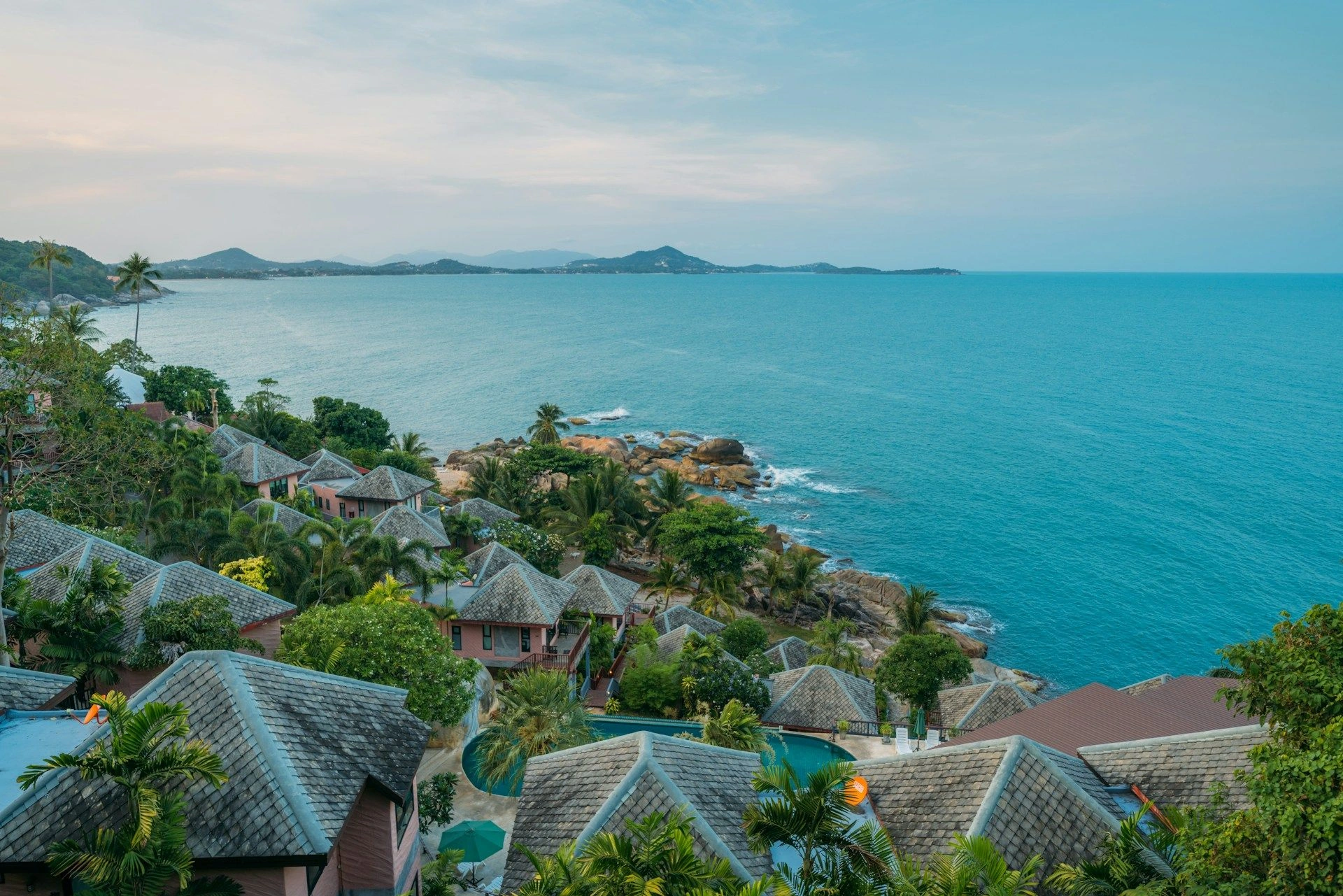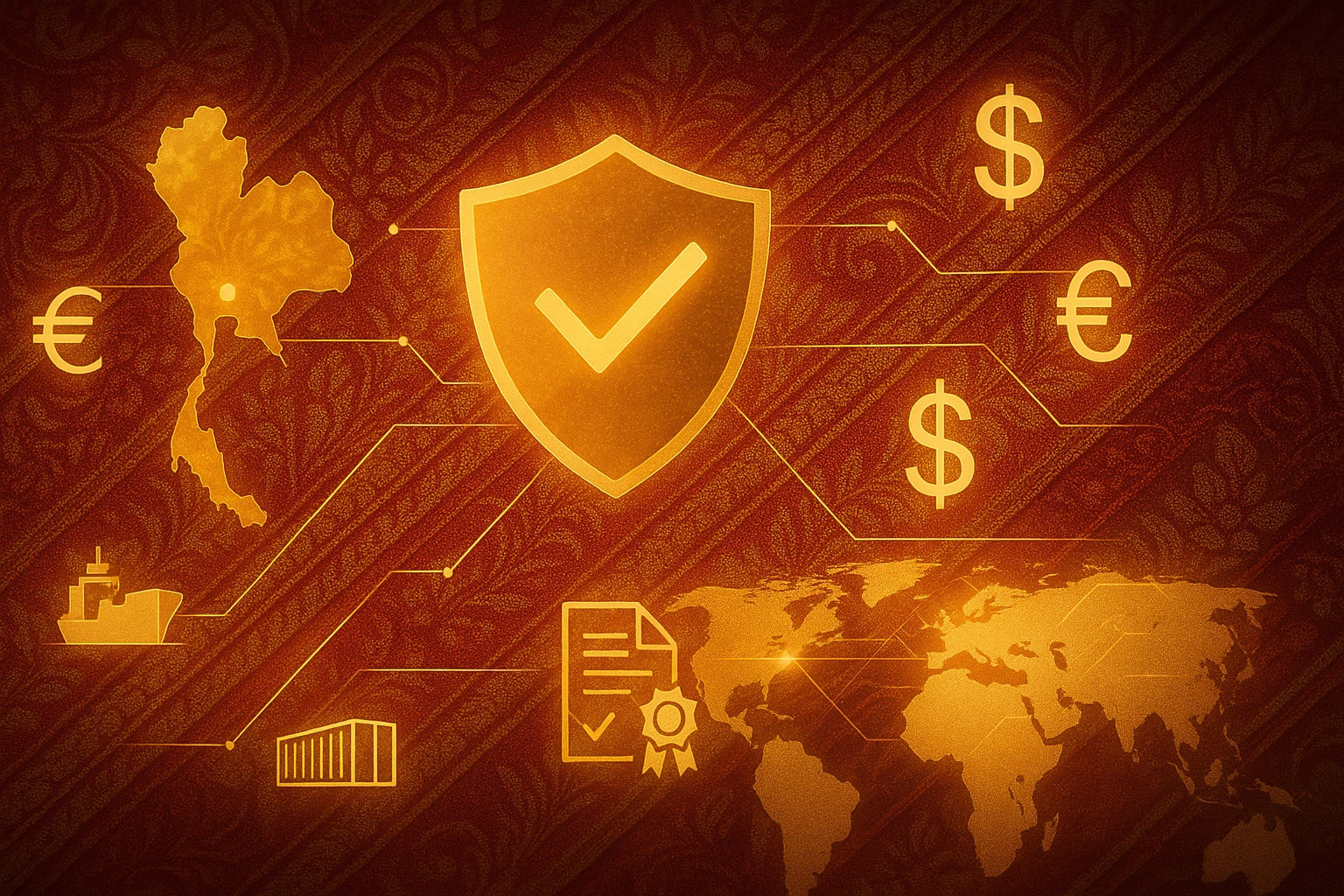Business Process Outsourcing for Real Estate in SamuiClarify lease terms, permit stages, andhillside construction rules

Business advising for developers
brokers in Thailand
Tourism drives growth, but land rules are strict
Samui’s tropical appeal fuels demand for villas and resorts, yet coastal land comes with environmental zoning and steep permitting hurdles. VelesClub Int. handles full permitting flow and environmental impact clearance.
High rental returns, but license delays stall entry
Holiday rentals on Samui deliver attractive yields, but hotel license processing can delay operations. We manage end-to-end licensing — from fire safety to hotel registry — enabling fast legal starts.
Land prices rise, but infrastructure varies
Land values are rising steadily, but road access, drainage, and grid connections vary sharply by district. VelesClub Int. conducts full feasibility review to align infrastructure readiness with asset strategy.
Tourism drives growth, but land rules are strict
Samui’s tropical appeal fuels demand for villas and resorts, yet coastal land comes with environmental zoning and steep permitting hurdles. VelesClub Int. handles full permitting flow and environmental impact clearance.
High rental returns, but license delays stall entry
Holiday rentals on Samui deliver attractive yields, but hotel license processing can delay operations. We manage end-to-end licensing — from fire safety to hotel registry — enabling fast legal starts.
Land prices rise, but infrastructure varies
Land values are rising steadily, but road access, drainage, and grid connections vary sharply by district. VelesClub Int. conducts full feasibility review to align infrastructure readiness with asset strategy.

Useful articles
and recommendations from experts
All
Global Transactions
Popular
Thailand
How to Make Secure International Payments to Thailand in 2025 — Complete Compliance Guide
How to send and receive payments to Thailand without risks
14.08.2025

All
Global Transactions
Popular
Thailand
International Property Payments to Thailand — Secure Real Estate Deals for Global Buyers
How to send secure property payments to Thailand as a foreign buyer
14.08.2025

Global Market Guides
Real Estate News & Trends
Investment
Thailand
China, Russia and the USA made up the top three for purchasing apartments in Thailand
China, Russia and the USA made up the top three for purchasing apartments in Thailand
29.12.2023

All
Popular
Thailand
Affordable Domestic Flights in Popular Tourist Countries
Affordable Domestic Flights in Popular Tourist Countries
22.10.2023

Real Estate Advising in Samui
Why Samui remains a prime investment destination
Koh Samui is Thailand’s second most important resort island, with a mature property market driven by international tourism, long-stay expats, and branded hotel development. The island offers a unique blend of villa clusters, resort plots, boutique hospitality, and leasehold land packages for foreign investors. Beaches like Chaweng, Lamai, and Bophut are investment hotspots due to high rental demand and scenic appeal.
However, Samui’s real estate operations are governed by stringent environmental laws, topographical zoning, and fragmented infrastructure that can slow project delivery. VelesClub Int. delivers full-cycle advisory for professionals — from land acquisition and compliance to licensing, company structuring, and asset exit planning.
Ownership structures and legal limitations
Foreigners cannot own land directly in Thailand, and Samui enforces these national rules strictly — especially near the coast. Most investors use leasehold contracts (up to 30 years with renewals), Thai limited companies, or condominium purchases under the 49% foreign quota. However, Samui’s terrain often complicates land subdivision, slope compliance, and environmental classification.
VelesClub Int. structures secure legal entry paths — including BOI applications, leasehold layering, and company incorporation — to ensure safe control over assets while respecting local compliance rules.
Rental formats and hotel license requirements
Samui’s real estate market is heavily rental-driven — particularly short-term tourist rentals in villa clusters and condo hotels. Units rented for less than 30 days require full hotel licensing, including fire safety approval, environmental clearance, and municipal registration. Non-compliant operations risk shutdowns or fines.
We oversee hotel license applications, fire code surveys, drainage plans, and registration processes to ensure assets are fully compliant before going live on the rental market.
Land types and permitting complexity
Land on Samui is divided into ecological zones: green, yellow, and red — each with specific building limits. Beachfront land often requires environmental impact studies (EIA), slope surveys, and setback confirmation. Mountain plots face strict height and usage caps. Missteps in classification can result in rejected permits or forced project suspension.
VelesClub Int. conducts pre-purchase zoning checks, coordinates with local land offices, and manages all permit steps — from surveyor mapping to final build approval.
Construction licensing and timeline risks
Construction permits in Samui often face delays due to terrain checks, municipal backlogs, and inconsistent local interpretations. Projects without Thai-speaking representation or planning specialists can be paused mid-process. Coastal setback enforcement is also increasing.
We fast-track permit approvals using in-house engineers and legal coordinators. Our bilingual compliance team tracks every permit milestone to reduce delays and cost overruns.
Taxation and capital repatriation
All property sales in Samui are subject to standard Thai transfer taxes: 2% transfer fee, 0.5% stamp duty (or 3.3% SBT), and 1% withholding for corporate sales. Rental income is taxable under Thai law and must be declared, whether via personal return or company statement. Foreign income repatriation requires properly documented FET forms from licensed Thai banks.
VelesClub Int. ensures that all purchase and rental flows comply with Thai tax law, and we assist with structuring to optimize repatriation, withholding, and filing compliance.
Key locations and infrastructure gaps
Samui’s property hotspots include Chaweng, Lamai, Maenam, and Plai Laem — each with different infrastructure conditions and pricing tiers. Chaweng has the highest rental demand but often suffers from outdated drainage and noise exposure. Lamai and Maenam offer spacious villa lots but require transport planning. North coast areas are increasingly attractive for eco-developments but may lack direct road or grid access.
We conduct on-site assessments and verify municipal plans, water rights, and road accessibility before advising on acquisition — ensuring location choice aligns with your operational needs.
Investment models and ROI planning
Popular strategies in Samui include villa clusters for holiday rent, land banking for mid-term resale, boutique hotels, and build-to-sell projects for foreign buyers. Each format requires distinct licensing and timeline management. Long-term ROI hinges on managing legal friction and maintaining rental compliance.
VelesClub Int. builds tailored ROI models based on local pricing, yield benchmarks, compliance overhead, and currency exposure — helping clients assess profitability and risk from day one.
Digitized workflow and offshore control
Many real estate processes on Samui remain analog: title searches, permit filing, tax clearances. Foreign investors often lack on-the-ground teams to handle delays or document errors. VelesClub Int. digitizes the full asset lifecycle: from ownership records and license tracking to tax filings and renewal reminders.
Clients can monitor all project and ownership documents remotely — reducing delays and avoiding compliance lapses.
ESG and hillside development compliance
Hillside and beachfront projects on Samui are increasingly scrutinized for environmental impact. Developers must now consider erosion control, water runoff, and community access in their project design. ESG frameworks are also encouraged for international financing and future sale liquidity.
We provide environmental assessments, social compliance planning, and certification pathways — ensuring projects meet both Thai law and international ESG expectations.
Medical tourism and wellness infrastructure
Samui is home to several international hospitals, detox clinics, and retreat centers — making it a medical tourism hub. Investors developing long-stay accommodations or recovery resorts must meet medical zoning and Ministry of Health licensing standards. Rental or hospitality licenses are often insufficient alone.
VelesClub Int. helps clients secure health-use permits, adapt building design for accessibility, and align services with the wellness sector’s legal requirements.
Hybrid assets and flexible usage strategies
There is growing demand in Samui for multi-use properties that combine residential, rental, coworking, or wellness functions. These projects offer diverse income streams but require careful licensing. Cross-use of space may trigger overlapping tax or zoning obligations.
We assist in planning and registering hybrid assets — ensuring each use case has a compliant legal basis and that structures support multi-format operations without conflict.
Exit planning and liquidity models
Liquidity in Samui depends on asset category. Villas and rental properties can often be sold to foreign buyers under leasehold or BOI structures, while commercial properties may be harder to divest without Thai participation. Proper documentation, licensing history, and title clarity enhance marketability.
VelesClub Int. structures assets with resale readiness in mind — ensuring that title, compliance, and repatriation frameworks support clean exit transactions for both domestic and foreign buyers.
Conclusion: Structuring success on Samui
Koh Samui offers a high-potential real estate market — with demand for hospitality, residential, and mixed-use assets driven by tourism and international lifestyles. However, terrain complexity, zoning strictness, and procedural opacity create serious hurdles for investors, especially foreign developers or brokers entering the market without local support.
VelesClub Int. bridges these challenges by delivering structured real estate advising — including legal navigation, compliance monitoring, digital tracking, and full-cycle strategy. Our advisory model enables international professionals to unlock value securely in one of Southeast Asia’s most scenic — and complex — real estate landscapes.
Currency control and foreign capital flows
Thailand requires all foreign investment inflows to be registered through licensed financial institutions using Foreign Exchange Transaction forms (FET). Errors or delays in registration can lead to repatriation issues or tax complications during exit.
VelesClub Int. manages all aspects of currency declaration, banking channel setup, and regulatory filings — ensuring clean, compliant investment flow and secure capital return options.
